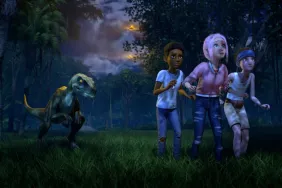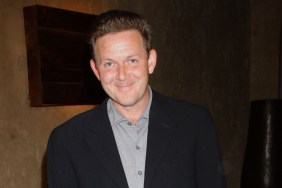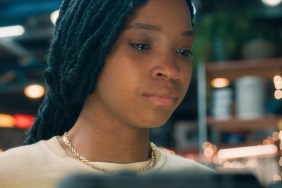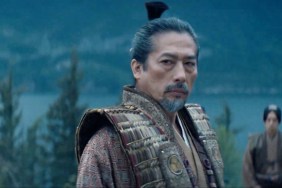Maybe that title sounds a bit cheeky of us, but ComingSoon.net has talked to director Edgar Wright so many times in the past six years, and over the course of that time, we’ve often discussed his new movie Scott Pilgrim vs. the World, which finally opens Friday after five years of development, writing, filming, editing, FX and everything else.
Adapted from the six “Scott Pilgrim” graphic novels by Bryan Lee O’Malley, which have been published by Oni Press over that same amount of time, Wright’s latest stars Michael Cera in the title role of a semi-clueless 22-year-old Toronto bass player whose attraction to a sophisticated American named Ramona Flowers (Mary Elizabeth Winstead) leads to him having to take on her seven evil exes in battle. At the same time, Scott’s band Sex Bob-omb is moving up the ranks, which ultimately leads to a showdown with Ramona’s seventh evil ex Gideon Gordon Graves, played by Jason Schwartzman.
For fans of Wright’s previous two movies Shaun of the Dead and Hot Fuzz, both done with Simon Pegg and Nick Frost, it’s another amazing film experience where you can’t even blink in case you might miss something, and it’s quite amazing how much of O’Malley’s six volumes of stories have made it into the movie.
With that in mind, we now have one of our longest interviews with Edgar to date, covering a lot of ground in terms of Scott Pilgrim that we haven’t covered in previous interviews. We’re especially glad that we got to talk to him about his older brother Oscar, who has been a bit of an unsung hero in Edgar’s success over the years. Throughout the interview, we were quite surprised how level-headed Edgar’s been able to remain throughout the process, and that he made the time for us during what’s turned into an insanely busy press tour. In fact, we begin and end our interview with the rather META discussion of that press tour. Just for fun, we used that as a crossover point to another interview we did with one of the film’s stars, newcomer Ellen Wong, who plays Scott’s “fake high school girlfriend” Knives Chau. You can read that interview later this week.
ComingSoon.net: I assume this press tour must be easy compared to 18 months making the movie.
Edgar Wright: I guess so. It’s all sort of blending into one. It was more than 18 months, it was like two years of making the movie. I mean, two years working on it full-time and five years on and off doing the adaptation. We only really finished doing the film like three weeks ago. I kinda started doing press before it even.
CS: It came out great and all that hard work paid off. When someone writes a book about your movies, they’re gonna look at this movie as a huge departure from “Spaced” and “Shaun” and “Hot Fuzz,” because you’re not working with Simon on it. Was this some sort of a challenge to yourself to show that you could do something completely apart from them?
Wright: I guess so. It’s funny when people ask (that) on this press tour, they say, “Oh, is it weird not directing Simon Pegg and Nick Frost?” I always think it’s kind of a weird question because I think, well does anybody ask Simon Pegg, “Was it weird being directed by Steven Spielberg instead of Edgar Wright?” (Laughs)
CS: That’s the thing. We have asked him that!
Wright: Oh, you have? Okay, well then it’s okay.
CS: It’s weird, because you worked with them literally for like 10 years so that almost every scene you’ve directed has at least one of them in it, I would guess.
Wright: You know, I think the thing is that everybody eventually does something different. I don’t think there’s a single “partnership in cinema” where people have stayed together for every single film. I mean, Scorsese did kind of like seven De Niro films, but even within that period, he kind of branched off and did other things with other people. It was nice in a way, especially for it to be my first film outside the UK, I couldn’t have asked for a more amazing cast. I guess it’s definitely a challenge in terms of your entire being to be completely tainted by your home country. I never really think… I wouldn’t really be able to tell you what a British sense of humor was. I know what my sense of humor is and I know the things I find funny, but I don’t know whether that necessarily is like a British sense of humor or whether it’s just my own sensibility.
CS: I mentioned this in my review. As I watched the movie, it really struck me that this wasn’t British. The fact that you made all these movie and a TV show with Simon and Nick that really defined London during the naughts, it took some adjusting to see you doing something set elsewhere. So did you feel like you had to turn off your British sensibilities to capture the Toronto environment?
Wright: I don’t know. I would hope my sensibilities were intact for “Scott Pilgrim.” I had amazing source material obviously and incredibly detailed source material, which was a gift, especially for shooting a film in a different country, we had an amazing resource of books. Bryan had created a love letter to Toronto, and I wanted to certainly bring that to the screen and retain the idea of Toronto being this magical playground. If it was a challenge, it was an irresistible one, the chance to cover as many genres as the books do in a film, and in a studio film, make a film with a decent budget that actually allows you to do some pretty outlandish action and comedy scenes. That was kind of just a gift really.

CS: Bryan’s books are amazing because they really appeal to a wide audience. I spent my 20’s in New York as you spent yours in London, so were you able to relate some of your experiences to being in your 20s in Toronto?
Wright: Yeah, I think it does. The more I think about it, I think that even though it’s set in Canada, I think it touches upon the youth experience of at least the last 30 years. I think anybody growing up in the late 70’s to now would be able to find a connection with the material. Most of the references to video games are pretty dated in the book and in a very nostalgic way, but I feel like it’s essentially like a rights of passage film with some kind of interesting flourishes. “Scott Pilgrim” has more in common with “Gregory’s Girl” than it does “The Matrix.” (Laughs)
CS: I think the video game references are the most interesting thing, since they cover everything form the beginning of video games to those from five or six years ago. In some ways, it shows how young people growing up playing video games might deal with the world. But we only see this moment in time and we never see how Scott might be in 20 years, whether he’ll grow to be a responsible adult or not. We just see the transition point in his life.
Wright: Yeah, I think that’s what’s interesting about it for me. Even without giving too much away about the end of the film, you’re still seeing him make another leap into the unknown. It’s unclear at the end exactly what’s going to happen after the end credits roll and I like that, it ends on a question mark, but that’s what’s interesting about it. In some way, you can see in the film the way that video games govern Scott Pilgrim’s life both for good and bad. The good side of it is that he has this extreme confidence in any adventure, whether it be romantic or kind of dangerous. The downside to it is that maybe if he hadn’t been playing too many adventure games, he treats the people in his life like sort of characters along the way that are like bit players and doesn’t really think long and hard enough about their feelings. Certainly, it’s one of the things I think is interesting about the character is he is flawed, and he kind of barrels through the first two-thirds of the film like he’s the hero of the movie inside his own head and some of the mistakes he makes, he has to face up to the responsibility of his actions. I really like that idea. I like that he makes mistakes and they come back to haunt him, both through how he deals with the Knives relationship and also that he bemoans the obstacles that are thrown at him in the form of the seven evil exes and even with the baggage of this slightly older, more experienced lover. But he himself is a hypocrite, because he had baggage and he’s caused heartache and chaos, and he doesn’t really see it that way because in his head, he’s kind of infallible. (chuckles)
CS: In the books, we really don’t see him play video games, and in the movie, we just see him in one scene playing “Ninja Ninja Revolution” with Knives. I don’t even have the impression he has a TV set in Wallace’s flat so that’s strange.
Wright: Oh, there is actually. You can actually see it in the first book, and there are a couple of scenes where he plays video games in the books, and we put in the one arcade scene. There is actually in Wallace’s apartment, it actually says, there’s a “SNES” (Super Nintendo Entertainment System) in the room, so there is a TV and console in Wallace’s apartment where Scott lives.
CS: One thing I liked about the movie was you gave Knives a more satisfying arc even than Bryan did. Everyone loves the character from Bryan’s books, but I feel the movie gives her a more satisfying arc, and also for Scott’s band Sex Bob-omb, they have an entire arc and they go somewhere rather than just breaking up and forming different bands. When you go that far off the books and do something completely different, how often do you go to Bryan and ask, “Is that okay?”
Wright: He was involved all the way through. He certainly read every draft or even half draft of the script. Most of those decisions were made quite early on, especially about Sex Bob-omb’s arc and he wanted to do something different for the book. To be honest, I never really listened to any fan talkback about the adaptation, because I kinda had the hotline to Bryan the entire time. As a collaborator, he was always amazingly un-precious in terms of he liked the diversions, and I think he sort of liked that we did something different, because it meant that the books would always be the books, the books would be canon, and the film would be a Bizarro version. The idea of the Knives story arc was that we really loved the scene in Volume 2 where Knives fights Ramona in the reference library, but there was no way of putting that in the film at the halfway mark, because it seemed so climactic, so we found ways to change the direction. The time compression in the film is very different from the book. The books are like a long-term relationship, and the film is like a mad fling. What’s always nice that you can take subplots and arcs from the book and make them play out in different ways by the timing of where they land, so actually sort of by taking Knives’ arc and having it resolve itself in a different point in the story, it’s like it suddenly becomes a French farce. It’s like, well, if Knives decides to crash the party at this point, what happens next? These were all things that were inspired by the books. The idea of the band Sex Bob-omb staying around a bit longer is in the books they kind of break up or fall apart at the halfway moment of the book. We wanted to mirror that as Scott is going through his “Seven Chambers of the Shaolin” (laughs) with the exes, is that Sex Bob-omb are also on the rise through the music scene, so we have the Battle of the Bands which is kind of established in Book 1, but we liked this idea of keeping it going so that Sex Bob-omb would be more of a presence throughout. Their ascension through the ranks is contrasted with Scott and his seven rings of hell, basically.

CS: One of the only really disappointing things about the books and the movie is that they both eventually end. I don’t know if people are going to be going through withdrawal or not in the next year, but in Scott, Bryan created this character who could be like Peter Parker or Spider-Man where you tell different stories about his life. Did you or Bryan ever think about where Scott might be in the future character, who could be like Spider-Man, where you could jump in and out of his life with new stories. Did you or Bryan imagine where he might be in ten years or so and then work backwards or could you not think about where he might end up after the movie ends?
Wright: I don’t know. I think, to be honest, Volume 6 is just recently finished, I think maybe less than three months ago, Volume 6 hadn’t been fully finished even though it had been written. The film was only about a month old, so it essentially feels like… I know it’s actually nice to feel we’re resolving right here. Especially at Comic-Con, I really started to feel like this is the right thing to do with this film is that the book and the film come out in 2010 and the game. I think in a weird way, I’m not sure that we want to be… that there was never really a chance of doing a six part series. I think we would have been laughed out of the studio, so I don’t think we necessarily want to be making a film of “Scott Pilgrim’s Finest Hour” in 2020. (chuckles)
CS: There’s been so much influence back and forth between the books and the movie. Did you show Bryan at least the unfinished film before he showed you Volume 6 or vice versa?
Wright: He saw a bunch of stuff while we were filming. Then he saw the first cut of the film in December, which was like a 126-minute version of the film. I guess that would’ve been before he finished the last book. But he’d written the last book. You know, it was a really organic process. Right before we started shooting, Bryan worked on the final shooting script. He kind of worked as an unofficial script doctor with me and Michael Bacall in Toronto, and there are a couple of lines in the finished film. For me, what I think makes this a nicely incestuous collaboration is that there were lines from the 2006 draft of “Scott Pilgrim” which crop up in Bryan’s books, in Volumes 4 and 5, and there are a few bits that crop up in Volume 6. I’m talking about very minor sort of… I’m not trying to take any credit away from Bryan and his books. (laughs) He would always be very polite in email and say, “Can I use the line for the Roxy fight?” So I was always pleased when that would happen, and also, on top of that, and this made me very happy at Comic-Con, but there was one particular line that three nights in a row got a round of applause, which is not from the book, but is written by Bryan. I thought, “Well, hopefully that says everything is that this is a nice collaboration because we’ve done something that’s different from the books and it diverges.” I think the thing with an adaptation like this where you diverge a little more is hopefully, the book’s the book and the film is the film. I hope that if people hadn’t read the book and they saw the film that would be the best way to disappear into Bryan’s world. In a weird way, if people who watch the film and they want more, “I want to see Scott on more adventures,” they’ve got six volumes to luxuriate in.
CS: I was listening to your appearance on “The Treatment” with Elvis Mitchell last night and there were things you were talking about in terms of the hidden numbers that I didn’t catch either of the two times I’ve seen the movie, so I feel I have to go back a third time. This is a movie you have to see a bunch of times to catch things, which was the case with “Hot Fuzz” and “Shaun” also, but maybe even moreso in this one.
Wright: I’m always a big fan of that. I think that myself and Simon and Jessica when they were working on “Spaced” stories were big fans of making things very dense, and that came from, I dunno, I think from “The Simpsons.” But I can remember that with several films growing up that I would watch them several times to make sure I got everything. I mean, certainly as a kid you end up watching “Airplane!” as many times as possible, so you make sure you see everything going on. I remember that about “Raising Arizona,” I remember about that vividly, watch it, because I would keep discovering things on the second, third or fourth watch. So I’m a big fan of that. Some of them are the exes and the numbers are almost designed to be there for a second watch. I like that idea of having coding, but also, if you want to see it a third time, there’s a whole sh*tload of stuff going on in the opening sequence, subliminal images and coding for each character. Each character has some kind of code to their character, whether it’s something as simple as when Michael Cera’s name pops up, his graphic is the bassline within that song or Audrey Plaza has black boxes around her name or Anna Kendrick has coffee stains around her name. Chris Evans has two X’s scrawled into his credit and stuff. We tried to kind of code every actor with something that was important to their character. I’m a big fan, and I feel like it’s the way I used to read comics as a kid. It’s funny when people ask about the pace of “Scott Pilgrim.” My answer to that is I feel like when I used to read comic books as a kid, I used to read them really fast, and especially when it got to action. Given how much I like action and I like the artwork in comic book action, I would read the action really fast, I would skip through it like crazy and read it almost as fast as the onomatopoeic sound effects. You’d turn a page and there would be two pages of action, and you’d go, “Biff! Bang! Pow!”

CS: You’d just read the sound effect words, right.
Wright: Then, after I read it, I would go back and look at all the action frames in much more detail and look at them like I was in a gallery. I remember I used to read a lot of Marvel Comics when I was between the ages of 10 and 18, and that was exactly how I used to read them. I would rip through them really fast, maybe get through one in like about 20 minutes and then go back and look at all the frames in great detail. I hope that’s how people might watch this film if they enjoyed it. I’m in control of the pace as the director and it’s certainly moving at quite a clip, but there’s lots to go back and luxuriate in afterwards.
CS: I think you may have a future working with Jerry Bruckheimer. I interviewed Mike Newell and he said working with Jerry Bruckheimer was frustrating because he always wants everything to be cut so fast, while he wanted to slow things down. I think you may have to do a movie in the future with Jerry Bruckheimer, so that he can tell you to slow things down.
Wright: (Laughs) I feel like by doing “Hot Fuzz” I already did that actually. (laughs)
CS: That’s true. I’ve interviewed Jerry so many times and I’ve never asked him about “Hot Fuzz.” I’m sure someone has.
Wright: I’m not sure whether those guys… I once met Michael Bay and asked him about it, and even though he was very nice about it, I wasn’t really sure whether he’d actually seen it or not. I said, “Oh, I’m Edgar, I directed ‘Hot Fuzz.'” He was like, “Right, right, funny… that’s with the guy from ‘Mission: Impossible III’ right?” That’s how he described that film, so I was thinking, “I don’t know whether he saw it or not.” (laughs)
CS: I know Shia saw it because I remembered talking to him before “Hot Fuzz” came out and he was freaked out about “Disturbia” opening against “Hot Fuzz.”
Wright: I remember you telling me about that, that’s funny.
CS: One thing about this movie is that it was really made in the public eye, even more than “Hot Fuzz,” where you had some production videos. This one you had the blog and then you were posting about it on Twitter during post-production. There were so many different remix videos. It’s really amazing you can still get more out of the movie even with seeing all this stuff. What appeals to you as a filmmaker to be in the public eye while making a movie and having so many people know what’s going on?
Wright: Well, in the case of the photo blog, with “Shaun of the Dead” and “Hot Fuzz,” I never took any kind of record of the shoot for myself at all and there are only photos by other people. This, for me, especially with a really long shoot, because we shot for 104 days on “Scott Pilgrim.” Really, what’s amazing to me was that photo blog and I’m so glad I did it. It’s a real OCD thing, this project, where January 1st I’m going to start and do one every day, and I did it every day–they were always from that day and I was very anal about it–but what was really great looking at that is I can totally see my year in diary form. I don’t have a time to write a diary but I look at those photos, I know exactly what I was doing every day. It was as much for me as everybody else. I think it was also nice, and I had to be clever about it, because I couldn’t show too many spoilers, but I just wanted people to see the process from a very kind of seemingly obscure things like seeing little details that amuse you when you’re actually on set. Like Scott Pilgrim and his stunt double wearing the same jeans and same sneakers. “I have to get a picture of that, I have to get a picture of your legs.” And then when there’s like two stunt doubles, it’s like “All of you stand together, so we all got the same sneakers, same jeans.” I remember it was just those sorts of things amused me, the little details about the production. I think in terms of the marketing stuff, I’ve heard that from a couple of people where they’ve said, “Oh, you see the trailer for ‘Scott Pilgrim,’ you’ve seen the whole movie.” I keep saying, “I don’t think you have, it’s pretty dense!” (Laughs) “You’ve seen two and a half minutes of a 112 minute film, it’s pretty dense, so even if you’ve seen all of the trailers and all the remixes, there’s still gonna be a whole bunch of stuff.”

CS: Yeah, there’s that whole fight sequence between Roxy and Ramona and that’s an amazing two or three minutes by itself and nobody’s seen any of that. I want to talk about the music because you got pretty much every Toronto-based musician and I was surprised there was no Crystal Castles on there. I know you must have heard of them and they even have the video game references in their name.
Wright: Oh, yeah. You know, I had and they did something but there wasn’t really a slot for them particularly, but I do like them. I think sort of the people we got working on it were right for the particular slots and even in the case where they were playing against type, like Broken Social Scene’s songs for the film don’t sound anything like them. That’s kind of have the fun. Whereas Metric are having a ball playing like a pastiche version of themselves. Yeah, I’m so pleased with the amazing roster of talent on the soundtrack and a lot of that credit goes to Nigel Godrich for bringing that all together, but we had fun doing it. Even beyond the artists performing within the film like Beck, Metric, Broken Social Scene, Cornelius, Dan the Automator, just on the score, the roster of the talent working on the score like Kid Koala, Danny Goffey and Gaz Coombes from Supergrass, and Joey Waronker, just amazing, and David Campbell, Beck’s Dad, doing the strings.
CS: Wow, I didn’t know that.
Wright: It was just amazing, so the soundtrack is just like a sonic embarrassment of riches. (laughs)
CS: A lot of people who saw the movie in the last couple of weeks have been upset they can’t buy the soundtrack yet and have to wait.
Wright: On Tuesday. You only have 48 hours until it’s available. And Nigel’s album is out on iTunes on Tuesday, too.
CS: After working on a movie this long, obviously you’re going to bring it to a couple of places over the next couple of months, and you’re going to be doing press for it. Do you think you’ll get to the point like David Point where next year you’ll have to say, “Okay, I can’t talk about ‘Scott Pilgrim’ anymore.” Has it gotten to that point where you still have a little more energy in you to keep talking about “Scott Pilgrim” for a while?
Wright: Yeah, I mean it’s still fresh. The paint is still wet on the film. I think once the paint dries, I’ll stop talking about it. (Laughs) What’s so crazy in the way we edit now is that the DVD is almost done, which is really insane. It’s really very strange to see a “making of” documentary before the film’s even finished. I’ve seen nearly all of the extras that we’ve been doing, and the making of documentary is really great. I think the Blu-ray DVD, which I think is sort of Christmas, it’s just ridiculously jam-packed with stuff.
CS: I come from a music background, so I worked on albums which took a year and a half of listening to the same songs. I can’t even imagine what this must have been like, so when does it become a job or do you just always have that light at the end of the tunnel knowing you’ll get it done?
Wright: You know what? You’ve always got to be really careful saying something like that because even if on Twitter, I said anything that was kind of a complaint in jest about how, I dunno, if I wrote on Twitter, “I’ve been editing on like three or four hours of sleep,” somebody would say, (sarcastic tone) “Oh, what a terrible trial it must be to be a film director.” (Laughs) And it’s true. I’m not working in a coal mine, I’m not in Afghanistan. I frequently pinch myself and say, “I can’t believe I get paid to do this.” It’s incredibly hard work, and I’ve never worked on something so hard, but it is a very high-class problem to have.
CS: Even when you say stuff like that on Twitter, I think most people just think, “God, this guy is so dedicated to this project.” I’m not sure anyone thinks you’re complaining at all.
Wright: That’s the thing. I take the responsibility of being a film director, and also of having a budget, I took it very seriously. With “Scott Pilgrim,” because it’s a film with like four times the budget of “Hot Fuzz,” I want to make sure it looks twice as expensive as that, you know what I mean? I think with any of these things, especially when you have so much talent in front and behind the camera, everybody has to have their moment to shine. I have to please the fans of the books and make sure they’re happy with the film, but also, to kind of make sure… I had these amazing resources and I get the max out of them, and the people will watch the film and think, “Wow, I really got value for my money for my twelve dollars.” Because how many summer films have you seen where you kind of haven’t thought that?
CS: Quite a lot of them.
Wright: So I would hope that, at the very least, anybody who sees “Scott Pilgrim” will come out thinking, “Wow, I got my value for money out of my ticket price.”

CS: You mentioned people behind the scenes and I want to ask about Oscar. After all these years, I’ve heard so much about Oscar and his contribution and what he adds with his storyboarding. Is Oscar ever gonna do an animated movie or something where we can see what he can do on his own?
Wright: He’s working on something right now actually. He has always directed shorts and stuff and I mean, my brother is so talented. He is my older brother by two years. When we were teenagers, we used to kind of hate each other’s guts, and then slowly, as I’ve been working, he’s become more involved in each project. On this one, basically the way it works with the storyboards is I would scrawl the storyboards like a doctor’s prescription and then Oscar would embellish them. It’s kind of a testament that we have a very similar artistic eye, that Oscar can always translate my doodles into the really great storyboards. Then also, especially on this film, I definitely defer and delegate to him as a graphics designer. There was one day when there was a second unit shoot. It was just an establishing shot of something and we were shooting something else and we had to get this other shot at the same time. There’s this one time I got Oscar to go down and said, “Just make sure that the shot looks cool.” There was a storyboard of it, but I trusted Oscar’s eye in lieu of my own, is that I figured we’re brothers and we actually have a very same compositional eye. He’s an amazing artist and him working with Double Negative and Frazier Church, and also with Brad Allen in terms of concept stuff, it was amazing to have him around. He worked so hard, and a lot of the animation in the film is his. He designed the dragons and the Yeti and stuff. There’s a lot of things in the film that are Oscar’s designs, and a lot of the video game graphics Oscar designed. Basically, whilst we were editing upstairs, he was working downstairs as an animator and graphic designer. I’m kind of overseeing a lot of the animations in the film.
CS: Obviously you’ve been working on this so long and everyone’s asking you what you might do next, and I assume you’ll spend some time relaxing and clearing your head. But have any of the things you were developing before “Scott Pilgrim” lost their luster and just don’t seem like something you might do following “Scott Pilgrim”?
Wright: I think I have to wait and see… it’s strange though, because you don’t really know. Once you finish a film like this, after everything, you don’t really know where your head is at quite yet. I know there’s three things that I have writing commitments now: one with Simon and Nick, another draft of “Ant-Man” and also this project “Baby Driver” that I’ve been working on for a long time. I’m going to return to all three of those in some regard before the end of the year. I’m going to have a bit of a break, and try and sleep more than six hours. I’m going to go work in a coalmine. (laughs)
CS: Then you’ll get to complain about how bad working in a coalmine is and people on Twitter will go, “Oh yeah, he’s right.”
Wright: “I thought film directing was tough; working in a coalmine is REALLY tough.” I think also it’s a fallacy. It’s funny because in every interview, everybody said, “So is ‘Ant-Man’ next?” and eventually you have to say, “You know it’s a fallacy that a director is in control of what’s next.” Usually, it’s about what’s ready and what breaks right. It’s about, “Have we got a script we’re happy with? Do we have an actor that the studio likes? Okay, let’s do it.” And “Scott Pilgrim” came together kinda like that in that it was just what was kind of ready next. You know what? If we had actually finished a draft of “The World’s End” or “Ant-Man” had gotten into a more finished state, that could have easily been the film after “Hot Fuzz,” but it’s just the way it breaks basically.
CS: I keep hearing about all these projects that come together within a couple of months like “Zombieland” which they finished in seven or eight months, which is pretty insane.
Wright: I kind of put 200% into everything. Also, when I’m working on “Scott Pilgrim.” I’m not a multi-tasker. I can’t do anything else. Even someone from the studio at one point asked me during the edits, “So are you writing at the moment? What else are you doing?” I said, “Nothing. I’m editing like 16 hours a day! That’s it, that’s it until this film comes out.”
CS: And once the film comes out in the next region, you’ll then have to go there and talk about it more.
Wright: Well, mostly that pretty much ends at the end of August. There’s international stuff, and I haven’t quite figured out yet whether I’m gonna travel with the film around the rest of the world or I might just have to pull a J.D. Salinger and disappear for a little bit.
CS: Just send Michael. Michael can go there.
Wright: Yeah, well, there’s enough cast to go around the world. Even now, we now have the cast split off onto two separate press tours to cover all bases.
Fortunately, we’ve found a solution for Edgar, but to find out what that is, you’ll have to read our exclusive interview with Ellen Wong out later this week.
Scott Pilgrim vs. the World opens nationwide on Friday, August 13.









